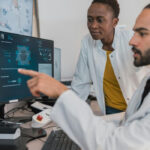Table of Contents
Unprecedented Changes in National Security
In a surprising move, President Donald Trump has dismissed General Timothy Haugh, the Director of the National Security Agency (NSA), along with Deputy Director Wendy Noble. This shakeup comes at a time when the U.S.
faces escalating cyber threats, particularly highlighted by the recent Salt Typhoon cyberattack attributed to China. The firings, first reported by The Washington Post, have raised eyebrows among lawmakers and security experts alike, who question the implications for national security.
Reactions from Lawmakers
Senator Mark Warner, vice chairman of the Senate Select Committee on Intelligence, expressed his astonishment at the decision, emphasizing Haugh’s extensive experience and dedication to national security. Warner stated, “General Haugh has served our country in uniform, with honor and distinction, for more than 30 years.” He further questioned how the dismissal of such a seasoned leader could enhance the safety of Americans, especially in light of the current cyber threats.
Representative Jim Himes echoed these sentiments, calling for an immediate explanation regarding the firings, highlighting the need for transparency in such critical matters.
Concerns Over Political Motivations
The abrupt nature of these firings has led to speculation about the motivations behind them.
Critics suggest that the decisions may be influenced by political agendas rather than genuine national security concerns. Reports indicate that far-right activist Laura Loomer may have played a role in advising Trump on personnel changes within the National Security Council.
This raises questions about the integrity of the decision-making process and whether it prioritizes loyalty over expertise. As the political landscape continues to evolve, the implications of these firings could have lasting effects on the U.S. intelligence community.



